Encyclopedia of Southern Jewish Communities - Athens, Georgia
Athens: Historical Overview
|
The city of Athens grew out of a trading settlement called Cedar Shoals located on the banks of the Oconee River in northeastern part of Georgia. This tiny village of 17 families was transformed in 1801 when the Georgia General Assembly selected Athens as the home of the recently established University of Georgia. The community developed and expanded over the years as people bought plots of land around the ever-growing school. Though the town was incorporated in December 1806, the first record of a Jewish resident did not appear until several decades later.
|
Stories of the Jewish Community in Athens
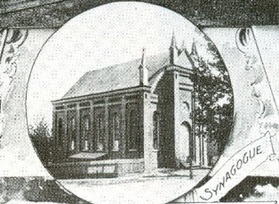
Early Settlers
The first Jews who settled in Athens arrived in the years before the Civil War. They came from Filehne, in the Posen area of Prussia. Moses Myers, born in Filehne in 1833, founded a dry goods business in Athens in 1858. He avoided the draft with an injured leg, though some Athens residents suspected that he was exaggerating his injuries to avoid serving in a war that he had little interest in. According to one account, people in Athens used to say that Myers rubbed his leg with a brick to keep it sore and some even yelled “bricks” at him whenever he appeared on the street. Whatever the truth of the matter, these stories reflected the suspicion with which native Athenians viewed these newly arrived Jewish immigrants, whose loyalty to the Confederate cause seemed suspect. Despite these rumors, Myers went on to run a successful business and later became the first president of Athens’ Jewish congregation.
Gabriel Jacobs, also born in Filehne, settled in Athens before the war and manufactured military caps for soldiers. He later would become the first service leader of the synagogue and its first religious school teacher.
The first Jews who settled in Athens arrived in the years before the Civil War. They came from Filehne, in the Posen area of Prussia. Moses Myers, born in Filehne in 1833, founded a dry goods business in Athens in 1858. He avoided the draft with an injured leg, though some Athens residents suspected that he was exaggerating his injuries to avoid serving in a war that he had little interest in. According to one account, people in Athens used to say that Myers rubbed his leg with a brick to keep it sore and some even yelled “bricks” at him whenever he appeared on the street. Whatever the truth of the matter, these stories reflected the suspicion with which native Athenians viewed these newly arrived Jewish immigrants, whose loyalty to the Confederate cause seemed suspect. Despite these rumors, Myers went on to run a successful business and later became the first president of Athens’ Jewish congregation.
Gabriel Jacobs, also born in Filehne, settled in Athens before the war and manufactured military caps for soldiers. He later would become the first service leader of the synagogue and its first religious school teacher.
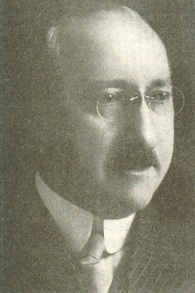 Moses
Michael
Moses
Michael
After the Civil War
Following the war, a growing number of Jews settled in Athens seeking economic opportunity. Caspar Morris, who had served four years as a private in the 16th Georgia Regular Volunteers after emigrating from Filehne, came to Athens to start his own dry goods business. Julius Cohen, who came to Athens from his native South Carolina, also opened a retail dry goods store in the years after the Civil War. In 1865, David and Theresa Michael moved from Jefferson, Georgia to Athens with their daughter Rachel and sons Simon and Moses. This family would go on to influence the Jewish community as well as Athens at large.
Organized Jewish Life in Athens
As their numbers grew, the Jewish merchants began to worship together and a Jewish community coalesced. They first met in Robert Bloomfield’s blacksmith shop. In 1872, a group of community leaders, including Moses Myers, Caspar Morris, David Michael, and Gabriel Jacobs, petitioned the Superior Court of Clarke County that a charter of incorporation be granted them for a congregation under the name of Kol Kadush Beni Yisroile and Congregation Children of Israel. The following year, the newly organized board of trustees purchased a parcel of land at the corner of Hancock and Jackson Streets and then a second adjacent portion in 1878 for their synagogue. On December 28, 1883, Rabbi A.R. Levy of Athens dedicated the newly constructed building, which would remain Congregation Children of Israel’s home for the next 84 years. The congregation also bought land in the Oconee Hills Cemetery in 1873 for use as a burial ground.
Following the war, a growing number of Jews settled in Athens seeking economic opportunity. Caspar Morris, who had served four years as a private in the 16th Georgia Regular Volunteers after emigrating from Filehne, came to Athens to start his own dry goods business. Julius Cohen, who came to Athens from his native South Carolina, also opened a retail dry goods store in the years after the Civil War. In 1865, David and Theresa Michael moved from Jefferson, Georgia to Athens with their daughter Rachel and sons Simon and Moses. This family would go on to influence the Jewish community as well as Athens at large.
Organized Jewish Life in Athens
As their numbers grew, the Jewish merchants began to worship together and a Jewish community coalesced. They first met in Robert Bloomfield’s blacksmith shop. In 1872, a group of community leaders, including Moses Myers, Caspar Morris, David Michael, and Gabriel Jacobs, petitioned the Superior Court of Clarke County that a charter of incorporation be granted them for a congregation under the name of Kol Kadush Beni Yisroile and Congregation Children of Israel. The following year, the newly organized board of trustees purchased a parcel of land at the corner of Hancock and Jackson Streets and then a second adjacent portion in 1878 for their synagogue. On December 28, 1883, Rabbi A.R. Levy of Athens dedicated the newly constructed building, which would remain Congregation Children of Israel’s home for the next 84 years. The congregation also bought land in the Oconee Hills Cemetery in 1873 for use as a burial ground.
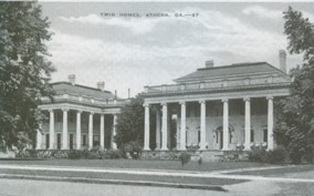
Civic Engagement
Along with their house of worship, Jews also sought to build institutions that benefited the entire Athens community. They were leaders in the effort to build a public library in town. While a library had been opened in 1880 for people not associated with the university, this facility was not free. A letter from Rabbi I.A. Rubenstein published on November 19, 1897 in the Athens Weekly Banner announced that “A Good Movement Has Been Started; Prominent Hebrews Organize to Secure a Library.” In his letter, Rabbi Rubenstein decried the lack of a free library open to everyone and appealed to citizens to donate books to the Hebrew Library Association, which would make them available to the public. Though the library would be housed in the Children of Israel synagogue, it would not be religious or sectarian in nature. While it’s unclear whether this plan ever came to fruition, it reflects the civic-mindedness of the fledgling congregation.
Jewish Businesses in Athens
Athens Jews benefited from the prosperity that followed the end of Reconstruction. Julius Cohen had struggled to start his dry goods business at the end of the Civil War, but by 1893, he was doing quite well. Next door was Moses Myers’ store, which was three stories high and had eight employees. Mendel Morris had begun small in 1870, with a small stock of dry goods worth close to $300 in a little corner store. By the turn of the century, he owned two stores and a large amount of real estate in Athens.
The most prominent Jewish businessman in Athens was Moses G. Michael. Born in Jefferson, Georgia in 1862, Michael moved to Athens with his family in 1865. By the age of 16, he had graduated from the University of Georgia with a degree in engineering, the youngest graduate ever at the time. In July of 1882, he began a dry goods business with his brother, Simon, in a small store that shared a building with the city jail and the city police court. The business grew and eventually the brothers took over the entire building. By 1885, they had entered the wholesale business and employed a traveling salesman to call on other stores nearby. Soon, they had five salesmen traveling throughout all of northeast Georgia and part of South Carolina. Moses’ sons, Leroy and David, would eventually take over the operation. In 1906, the Michael brothers bought the New Opera House, renaming it the Colonial Theater after making some luxurious renovations.
During his lifetime, Moses Michael, also called “Mr. Buddy,” played many roles within both the Jewish and larger communities. He served as the president of the Chamber of Commerce, president of the Old Club of Athens, and vice president of the Athens Savings Bank, which he founded with clothier Myer Stern in 1892. Michael was also treasurer of the Athens Board of Education and helped found the East Athens Night School. Michael was also involved with the Children of Israel congregation, often leading services when there was no rabbi and serving as superintendent of the religious school for 30 years.
Moses and Simon Michael were so close that, at the height of their prosperity in 1902, they built twin neo-classical houses. Whether this was a pure demonstration of their love for each other, or just as mutual desire to save money on architect fees, they built their identical mansions side-by-side and even connected them by a colonnade. Whatever the reason for this unique relationship and the brothers’ companion homes, it did not last. Simon moved to a different home in 1912 after the death of his youngest son, Bert, while Moses would live in his house until his death in 1944. Both houses were demolished in the 1960s.
Along with their house of worship, Jews also sought to build institutions that benefited the entire Athens community. They were leaders in the effort to build a public library in town. While a library had been opened in 1880 for people not associated with the university, this facility was not free. A letter from Rabbi I.A. Rubenstein published on November 19, 1897 in the Athens Weekly Banner announced that “A Good Movement Has Been Started; Prominent Hebrews Organize to Secure a Library.” In his letter, Rabbi Rubenstein decried the lack of a free library open to everyone and appealed to citizens to donate books to the Hebrew Library Association, which would make them available to the public. Though the library would be housed in the Children of Israel synagogue, it would not be religious or sectarian in nature. While it’s unclear whether this plan ever came to fruition, it reflects the civic-mindedness of the fledgling congregation.
Jewish Businesses in Athens
Athens Jews benefited from the prosperity that followed the end of Reconstruction. Julius Cohen had struggled to start his dry goods business at the end of the Civil War, but by 1893, he was doing quite well. Next door was Moses Myers’ store, which was three stories high and had eight employees. Mendel Morris had begun small in 1870, with a small stock of dry goods worth close to $300 in a little corner store. By the turn of the century, he owned two stores and a large amount of real estate in Athens.
The most prominent Jewish businessman in Athens was Moses G. Michael. Born in Jefferson, Georgia in 1862, Michael moved to Athens with his family in 1865. By the age of 16, he had graduated from the University of Georgia with a degree in engineering, the youngest graduate ever at the time. In July of 1882, he began a dry goods business with his brother, Simon, in a small store that shared a building with the city jail and the city police court. The business grew and eventually the brothers took over the entire building. By 1885, they had entered the wholesale business and employed a traveling salesman to call on other stores nearby. Soon, they had five salesmen traveling throughout all of northeast Georgia and part of South Carolina. Moses’ sons, Leroy and David, would eventually take over the operation. In 1906, the Michael brothers bought the New Opera House, renaming it the Colonial Theater after making some luxurious renovations.
During his lifetime, Moses Michael, also called “Mr. Buddy,” played many roles within both the Jewish and larger communities. He served as the president of the Chamber of Commerce, president of the Old Club of Athens, and vice president of the Athens Savings Bank, which he founded with clothier Myer Stern in 1892. Michael was also treasurer of the Athens Board of Education and helped found the East Athens Night School. Michael was also involved with the Children of Israel congregation, often leading services when there was no rabbi and serving as superintendent of the religious school for 30 years.
Moses and Simon Michael were so close that, at the height of their prosperity in 1902, they built twin neo-classical houses. Whether this was a pure demonstration of their love for each other, or just as mutual desire to save money on architect fees, they built their identical mansions side-by-side and even connected them by a colonnade. Whatever the reason for this unique relationship and the brothers’ companion homes, it did not last. Simon moved to a different home in 1912 after the death of his youngest son, Bert, while Moses would live in his house until his death in 1944. Both houses were demolished in the 1960s.
Conflict at Children of Israel
By the early 20th century, there were growing disputes over the style of worship at Children of Israel. The congregation was slowly adopting Reform Judaism, which angered some of its more traditional members. The congregation had never been strictly Orthodox; during the dedication of their synagogue in 1883 they had an organ and a mixed-gender choir, and the congregation joined the Union of American Hebrew Congregations (UAHC) by 1885. But over the years, the congregation disaffiliated with the Reform UAHC. In 1914, an Orthodox faction, led by Moses Michael, broke away to form the “Russian Jewish Congregation;” Michael led services for the traditional group. They rented a hall and worshiped separately from Children of Israel. The dispute was soon resolved as the breakaway group rejoined Children of Israel in 1916, which then numbered 38 member families. Apparently, this short-term breakaway did not leave too many hard feelings as Michael was elected president of Children of Israel in 1920. By 1925, Children of Israel had once again affiliated with the UAHC.
Community Growth
The Athens Jewish community grew in the early 20th century, reaching 185 Jews by 1927, as a new generation of Jewish businessmen came to Athens. Jacob Bush moved to Athens in 1915 with his family and founded Bush Jewelers. In 1912, Milton Lesser, a young bachelor, arrived in Athens and took up residence at Wolfe’s Boarding House on Hancock Street. He operated a men’s clothing store and became active in congregation affairs, eventually becoming its president in 1943.
The Athens city directory and U.S. Census provide a fascinating portrait of the Athens Jewish community in 1920. Sixty percent of Athens’ adult Jewish population was born in the United States, a remarkably high figure for a time in which Jewish immigrants dominated communities demographically around the country. Of those who were foreign born, a slight majority was born in Russia or Poland, while the remainder consisted of German immigrants. Most of these immigrants had been in the United States for several years; half had been in the country for at least 28 years. Although most had lived in Athens for many years, 38% of them were not yet naturalized citizens of the United States. Several of these immigrant aliens had been in the U.S. for several decades. Thus, the Athens Jewish community was simultaneously more native-born and unnaturalized and foreign than the average.
Far more typical was the concentration of Athens Jews in retail trade. In 1920, of the 64 Jews listed in the Athens city directory, almost a third were in the dry goods business, either as clerks or business owners. Many others were involved in other kinds of retail businesses, such as clothing, furniture, jewelry, or general merchandise. Over half of those employed were merchants of some kind, owning their own business. Slightly over a third worked as salesmen or clerks, including a number of female stenographers. Only 6% were professionals, while another 6% were skilled laborers, mostly butchers.
Athens Jews were involved in a wide array of businesses. Selig Bernstein was President of the Commercial Bank; his sons, Moses and Jake Bernstein, sold furniture and were directors of a funeral home. Sol Boley was a merchant and his brother, Sidney, was in the wholesale shoe business before he turned to real estate. “Big A” Aaron Cohen, Charles Stern, and “Moe” Levy owned men’s clothing stores; Dorsey and Frankenstein sold furniture; and Jake Joel owned the old Palace Theatre. In 1929, 18-year-old Henry Rosenthal leased space in the basement of the Michael Brothers store as a manager of a shoe concession. The following year, he opened his own store with chairs that he borrowed from Jake Joel’s Palace Theater. After World War II, Sol Abrams opened up the Harlem Theater, the first movie theater that catered to African Americans in Athens. Sol later expanded into the Beechwood Theater.
By the early 20th century, there were growing disputes over the style of worship at Children of Israel. The congregation was slowly adopting Reform Judaism, which angered some of its more traditional members. The congregation had never been strictly Orthodox; during the dedication of their synagogue in 1883 they had an organ and a mixed-gender choir, and the congregation joined the Union of American Hebrew Congregations (UAHC) by 1885. But over the years, the congregation disaffiliated with the Reform UAHC. In 1914, an Orthodox faction, led by Moses Michael, broke away to form the “Russian Jewish Congregation;” Michael led services for the traditional group. They rented a hall and worshiped separately from Children of Israel. The dispute was soon resolved as the breakaway group rejoined Children of Israel in 1916, which then numbered 38 member families. Apparently, this short-term breakaway did not leave too many hard feelings as Michael was elected president of Children of Israel in 1920. By 1925, Children of Israel had once again affiliated with the UAHC.
Community Growth
The Athens Jewish community grew in the early 20th century, reaching 185 Jews by 1927, as a new generation of Jewish businessmen came to Athens. Jacob Bush moved to Athens in 1915 with his family and founded Bush Jewelers. In 1912, Milton Lesser, a young bachelor, arrived in Athens and took up residence at Wolfe’s Boarding House on Hancock Street. He operated a men’s clothing store and became active in congregation affairs, eventually becoming its president in 1943.
The Athens city directory and U.S. Census provide a fascinating portrait of the Athens Jewish community in 1920. Sixty percent of Athens’ adult Jewish population was born in the United States, a remarkably high figure for a time in which Jewish immigrants dominated communities demographically around the country. Of those who were foreign born, a slight majority was born in Russia or Poland, while the remainder consisted of German immigrants. Most of these immigrants had been in the United States for several years; half had been in the country for at least 28 years. Although most had lived in Athens for many years, 38% of them were not yet naturalized citizens of the United States. Several of these immigrant aliens had been in the U.S. for several decades. Thus, the Athens Jewish community was simultaneously more native-born and unnaturalized and foreign than the average.
Far more typical was the concentration of Athens Jews in retail trade. In 1920, of the 64 Jews listed in the Athens city directory, almost a third were in the dry goods business, either as clerks or business owners. Many others were involved in other kinds of retail businesses, such as clothing, furniture, jewelry, or general merchandise. Over half of those employed were merchants of some kind, owning their own business. Slightly over a third worked as salesmen or clerks, including a number of female stenographers. Only 6% were professionals, while another 6% were skilled laborers, mostly butchers.
Athens Jews were involved in a wide array of businesses. Selig Bernstein was President of the Commercial Bank; his sons, Moses and Jake Bernstein, sold furniture and were directors of a funeral home. Sol Boley was a merchant and his brother, Sidney, was in the wholesale shoe business before he turned to real estate. “Big A” Aaron Cohen, Charles Stern, and “Moe” Levy owned men’s clothing stores; Dorsey and Frankenstein sold furniture; and Jake Joel owned the old Palace Theatre. In 1929, 18-year-old Henry Rosenthal leased space in the basement of the Michael Brothers store as a manager of a shoe concession. The following year, he opened his own store with chairs that he borrowed from Jake Joel’s Palace Theater. After World War II, Sol Abrams opened up the Harlem Theater, the first movie theater that catered to African Americans in Athens. Sol later expanded into the Beechwood Theater.
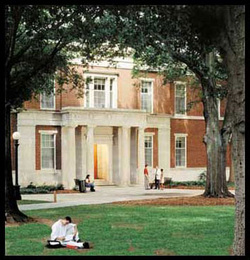 Hirsch
Hall
Hirsch
Hall
A handful of Athens Jews were professionals in the early 20th century, a harbinger of a trend that would eventually reshape the Athens Jewish community. The lawyers of that time included Max Michael, son of Simon, and Jerome Michael, son of Moses. Jerome would go on to an illustrious career as Athens’ city attorney and then assistant attorney general of the United States. Jake Brandt Joel, Abe’s son, entered the law profession after briefly taking part in the family theater business. He later became active in politics, serving five terms representing Athens in the Georgia General Assembly.
Jews were also involved with the University of Georgia. Harold Hirsch, a 1901 graduate of the school, left a permanent mark on his alma mater. Hirsch became successful as legal counsel and Vice-President of Coca-Cola in Atlanta. He endowed the law school building at the University of Georgia, which was named Hirsch Hall in his honor when it was dedicated in 1932. During his lifetime, Hirsch was second only to George Foster Peabody in his financial support of the University of Georgia. An increasing number of Jews taught at the university. Dr. Sigmund Cohn, a refugee of Nazi Germany, became the first Jewish faculty member at the university. Cohn was the first in a wave of Jewish faculty that have contributed significantly to the Athens Jewish community ever since.
After World War II
As new manufacturing plants in the small towns surrounding Athens began to sprout up in the 1940s and 1950s, more people moved to town and the Jewish community grew. Anri and Fina Kofino, members of the Athens synagogue, moved to Elberton, Georgia, a small town located an hour north, in 1959 to run a ladies garment factory owned by Fina’s brother. Robert Schindel came to Athens in 1953 to work for the Thomas Textile Company, which made baby clothes. He eventually took over and ran the factory himself until his retirement.
The years after World War II saw the Athens Jewish community grow from 90 people in 1937 to 210 by 1968. Nathan Jays moved to Athens in 1948. In 1960, he became the congregational president and did work with university Hillel for many years. Dave and Evelyn Abroms moved from Florence, South Carolina and bought Milton Lesser’s store. In 1957, Evelyn became the president of Children of Israel, the first time a woman served as president of a Reform congregation in the United States. Dr. Israel Berger, a radiologist from Savannah, settled in Athens in the 1950s. In the mid-1960s, Dr. Barry Simmons, whose family had taken over the Morris Held Paint Store, became the first Jewish dentist in town. He was named one of the ten outstanding young men of the year in 1970 for providing dental service to underdeveloped sections of the world. Around the 1950s, the Sterns family moved to town. After many years of success in business, they donated money to establish the Sterns Community House. This facility was eventually made available to the Jewish students at the University of Georgia through the Hillel Foundation.
By 1965, the synagogue needed major repairs and the city was planning an urban renewal project which required the destruction of the old building. The president of the congregation, Henry Rosenthal, negotiated an acceptable price for the property and then bought new land near the university upon which they would build a new synagogue. The new temple was dedicated on October 13, 1968. By the time of the congregation’s 100th anniversary in March 1973, its membership had increased to 78 families.
Jews were also involved with the University of Georgia. Harold Hirsch, a 1901 graduate of the school, left a permanent mark on his alma mater. Hirsch became successful as legal counsel and Vice-President of Coca-Cola in Atlanta. He endowed the law school building at the University of Georgia, which was named Hirsch Hall in his honor when it was dedicated in 1932. During his lifetime, Hirsch was second only to George Foster Peabody in his financial support of the University of Georgia. An increasing number of Jews taught at the university. Dr. Sigmund Cohn, a refugee of Nazi Germany, became the first Jewish faculty member at the university. Cohn was the first in a wave of Jewish faculty that have contributed significantly to the Athens Jewish community ever since.
After World War II
As new manufacturing plants in the small towns surrounding Athens began to sprout up in the 1940s and 1950s, more people moved to town and the Jewish community grew. Anri and Fina Kofino, members of the Athens synagogue, moved to Elberton, Georgia, a small town located an hour north, in 1959 to run a ladies garment factory owned by Fina’s brother. Robert Schindel came to Athens in 1953 to work for the Thomas Textile Company, which made baby clothes. He eventually took over and ran the factory himself until his retirement.
The years after World War II saw the Athens Jewish community grow from 90 people in 1937 to 210 by 1968. Nathan Jays moved to Athens in 1948. In 1960, he became the congregational president and did work with university Hillel for many years. Dave and Evelyn Abroms moved from Florence, South Carolina and bought Milton Lesser’s store. In 1957, Evelyn became the president of Children of Israel, the first time a woman served as president of a Reform congregation in the United States. Dr. Israel Berger, a radiologist from Savannah, settled in Athens in the 1950s. In the mid-1960s, Dr. Barry Simmons, whose family had taken over the Morris Held Paint Store, became the first Jewish dentist in town. He was named one of the ten outstanding young men of the year in 1970 for providing dental service to underdeveloped sections of the world. Around the 1950s, the Sterns family moved to town. After many years of success in business, they donated money to establish the Sterns Community House. This facility was eventually made available to the Jewish students at the University of Georgia through the Hillel Foundation.
By 1965, the synagogue needed major repairs and the city was planning an urban renewal project which required the destruction of the old building. The president of the congregation, Henry Rosenthal, negotiated an acceptable price for the property and then bought new land near the university upon which they would build a new synagogue. The new temple was dedicated on October 13, 1968. By the time of the congregation’s 100th anniversary in March 1973, its membership had increased to 78 families.
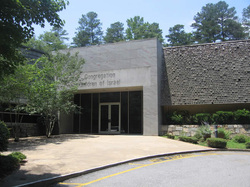
New Developments in the Jewish Community
As the university drew in more Jews from other parts of the country, a group of Orthodox Jews who did not wish to worship in the Reform manner of the Children of Israel developed. In 1972, three Orthodox Jews organized a small minyan. At first, they met in homes and then, later, in the Hillel building at the University of Georgia. The group grew as students and professors, many affiliated with the math department, began to participate. They started using a mechitzah, which separated male and female worshippers, and Congregation Shearith Israel of Atlanta loaned them a torah. After one of their members, Steve Letch, died of AIDS in 1988, they named their group Yadshmuel in his honor. The group has never had a rabbi of its own, but often takes advantage of the Chabad and Kollel Houses in the area, sometimes using their facilities and clergy. They are still not incorporated as a congregation, leaving Congregation Children of Israel as the only chartered congregation in Athens.
As of 1983, Congregation Children of Israel had grown to 83 member families. It soon became apparent that the temple, in particular the religious school, would need to expand to accommodate its growing number of students. In 1996, the Carol Bush Education Center was built in memory of member and native Athenian Steven Bush’s late wife. As a result of the new facility, enrollment increased from about 50 to 75 students.
As the university drew in more Jews from other parts of the country, a group of Orthodox Jews who did not wish to worship in the Reform manner of the Children of Israel developed. In 1972, three Orthodox Jews organized a small minyan. At first, they met in homes and then, later, in the Hillel building at the University of Georgia. The group grew as students and professors, many affiliated with the math department, began to participate. They started using a mechitzah, which separated male and female worshippers, and Congregation Shearith Israel of Atlanta loaned them a torah. After one of their members, Steve Letch, died of AIDS in 1988, they named their group Yadshmuel in his honor. The group has never had a rabbi of its own, but often takes advantage of the Chabad and Kollel Houses in the area, sometimes using their facilities and clergy. They are still not incorporated as a congregation, leaving Congregation Children of Israel as the only chartered congregation in Athens.
As of 1983, Congregation Children of Israel had grown to 83 member families. It soon became apparent that the temple, in particular the religious school, would need to expand to accommodate its growing number of students. In 1996, the Carol Bush Education Center was built in memory of member and native Athenian Steven Bush’s late wife. As a result of the new facility, enrollment increased from about 50 to 75 students.
The Jewish Community in Athens Today
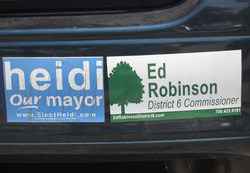
Today, Congregation Children of Israel has over 140 members. Many of the members are associated with the University in some way, while others are Jews who chose to retire to Athens. The congregation has almost doubled in membership since 1990.
In recent years, Jews have become active in local politics. In 2002, teacher and University of Georgia graduate Heidi Davison was elected mayor. Since then, she has contributed to economic development, community improvement, and environmental initiatives in Athens. After being involved in local environmental protection efforts for many years, Ed Robinson, owner of multiple small businesses, was elected District 6 City Commissioner in 2008.
Today, the Athens Jewish community is thriving, with Children of Israel at a historical peak in membership. With an increasing number of Jews being drawn to this quaint college town, the community looks likely to continue its growth.
In recent years, Jews have become active in local politics. In 2002, teacher and University of Georgia graduate Heidi Davison was elected mayor. Since then, she has contributed to economic development, community improvement, and environmental initiatives in Athens. After being involved in local environmental protection efforts for many years, Ed Robinson, owner of multiple small businesses, was elected District 6 City Commissioner in 2008.
Today, the Athens Jewish community is thriving, with Children of Israel at a historical peak in membership. With an increasing number of Jews being drawn to this quaint college town, the community looks likely to continue its growth.
